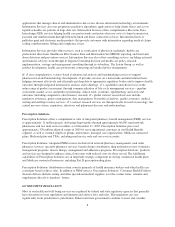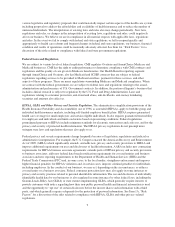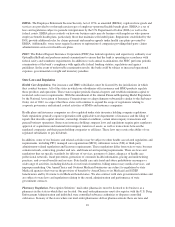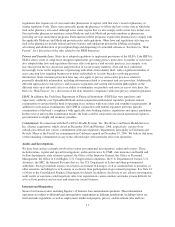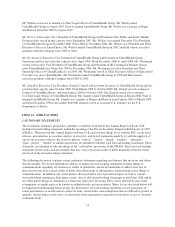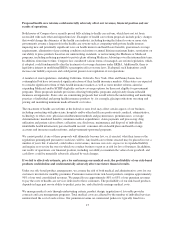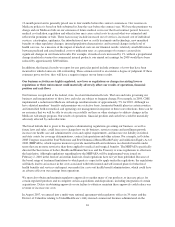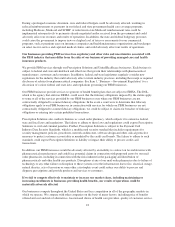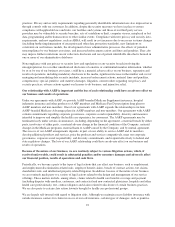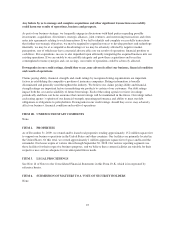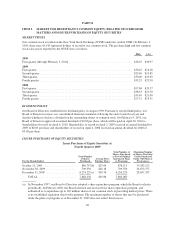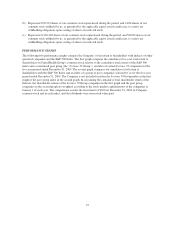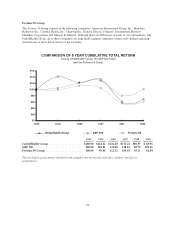United Healthcare 2009 Annual Report Download - page 20
Download and view the complete annual report
Please find page 20 of the 2009 United Healthcare annual report below. You can navigate through the pages in the report by either clicking on the pages listed below, or by using the keyword search tool below to find specific information within the annual report.During a prolonged economic downturn, state and federal budgets could be adversely affected, resulting in
reduced reimbursements or payments in our federal and state government health care coverage programs,
including Medicare, Medicaid and SCHIP. A reduction in state Medicaid reimbursement rates could be
implemented retrospectively to payments already negotiated and/or received from the government and could
adversely affect our revenues and results of operations. In addition, the state and federal budgetary pressures
could cause the government to impose new or a higher level of taxes or assessments for our commercial
programs, such as premium taxes on insurance companies and health maintenance organizations and surcharges
on select fee-for-service and capitated medical claims, and could adversely affect our results of operations.
Our businesses providing PBM services face regulatory and other risks and uncertainties associated with
the PBM industry that may differ from the risks of our business of providing managed care and health
insurance products.
We provide PBM services through our Prescription Solutions and UnitedHealthcare businesses. Each business is
subject to federal and state anti-kickback and other laws that govern their relationships with pharmaceutical
manufacturers, customers and consumers. In addition, federal and state legislatures regularly consider new
regulations for the industry that could adversely affect current industry practices, including the receipt or required
disclosure of rebates from pharmaceutical companies. See Item 1, “Business – Government Regulation” for a
discussion of various federal and state laws and regulations governing our PBM businesses.
Our PBM businesses provide services to sponsors of health benefit plans that are subject to ERISA. The DOL,
which is the agency that enforces ERISA, could assert that the fiduciary obligations imposed by the statute apply
to some or all of the services provided by our PBM businesses even where our PBM businesses are not
contractually obligated to assume fiduciary obligations. In the event a court were to determine that fiduciary
obligations apply to our PBM businesses in connection with services for which our PBM businesses are not
contractually obligated to assume fiduciary obligations, we could be subject to claims for breaches of fiduciary
obligations or entering into certain prohibited transactions.
Prescription Solutions also conducts business as a mail order pharmacy, which subjects it to extensive federal,
state and local laws and regulations. The failure to adhere to these laws and regulations could expose Prescription
Solutions to civil and criminal penalties. Further, Prescription Solutions is subject to the Payment Card
Industry Data Security Standards, which is a multifaceted security standard that includes requirements for
security management, policies, procedures, network architecture, software design and other critical protective
measures to protect customer account data as mandated by the credit card brands. The failure to adhere to such
standards could expose Prescription Solutions to liability or impact their ability to process credit card
transactions.
In addition, our PBM businesses would be adversely affected by an inability to contract on favorable terms with
pharmaceutical manufacturers and could face potential claims in connection with purported errors by our mail
order pharmacies, including in connection with the risks inherent in the packaging and distribution of
pharmaceuticals and other health care products. Disruptions at any of our mail order pharmacies due to failure of
technology or any other failure or disruption to these systems or to the infrastructure due to fire, electrical outage,
natural disaster, acts of terrorism or some other catastrophic event could reduce our ability to process and
dispense prescriptions and provide products and services to customers.
If we fail to compete effectively to maintain or increase our market share, including maintaining or
increasing enrollments in businesses providing health benefits, our results of operations could be
materially adversely affected.
Our businesses compete throughout the United States and face competition in all of the geographic markets in
which we operate. We compete with other companies on the basis of many factors, including price of benefits
offered and cost and risk of alternatives, location and choice of health care providers, quality of customer service,
18


